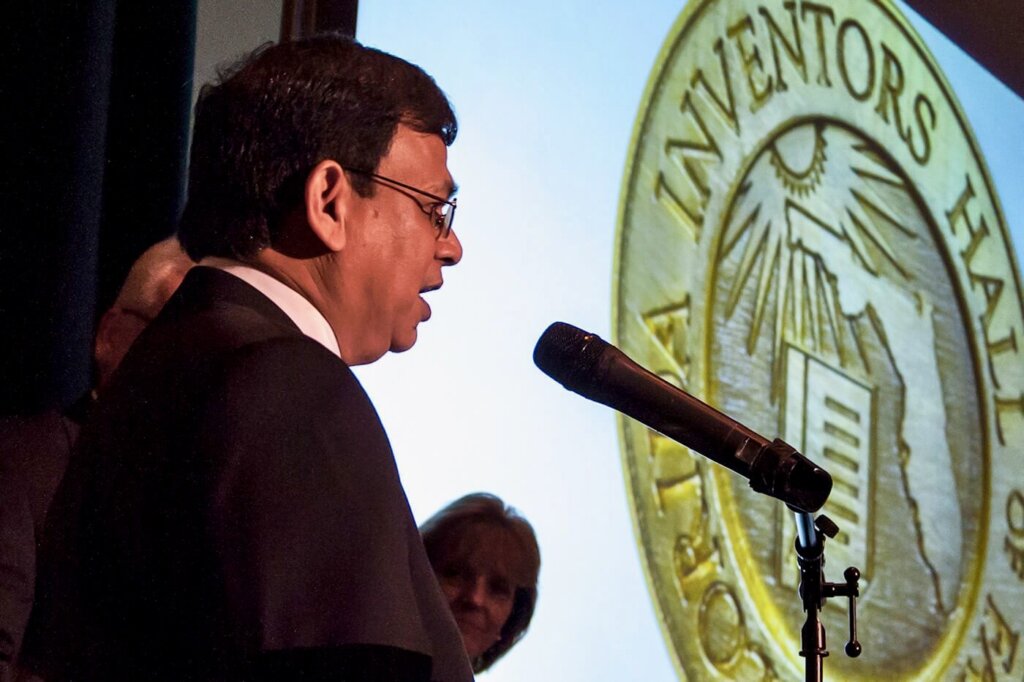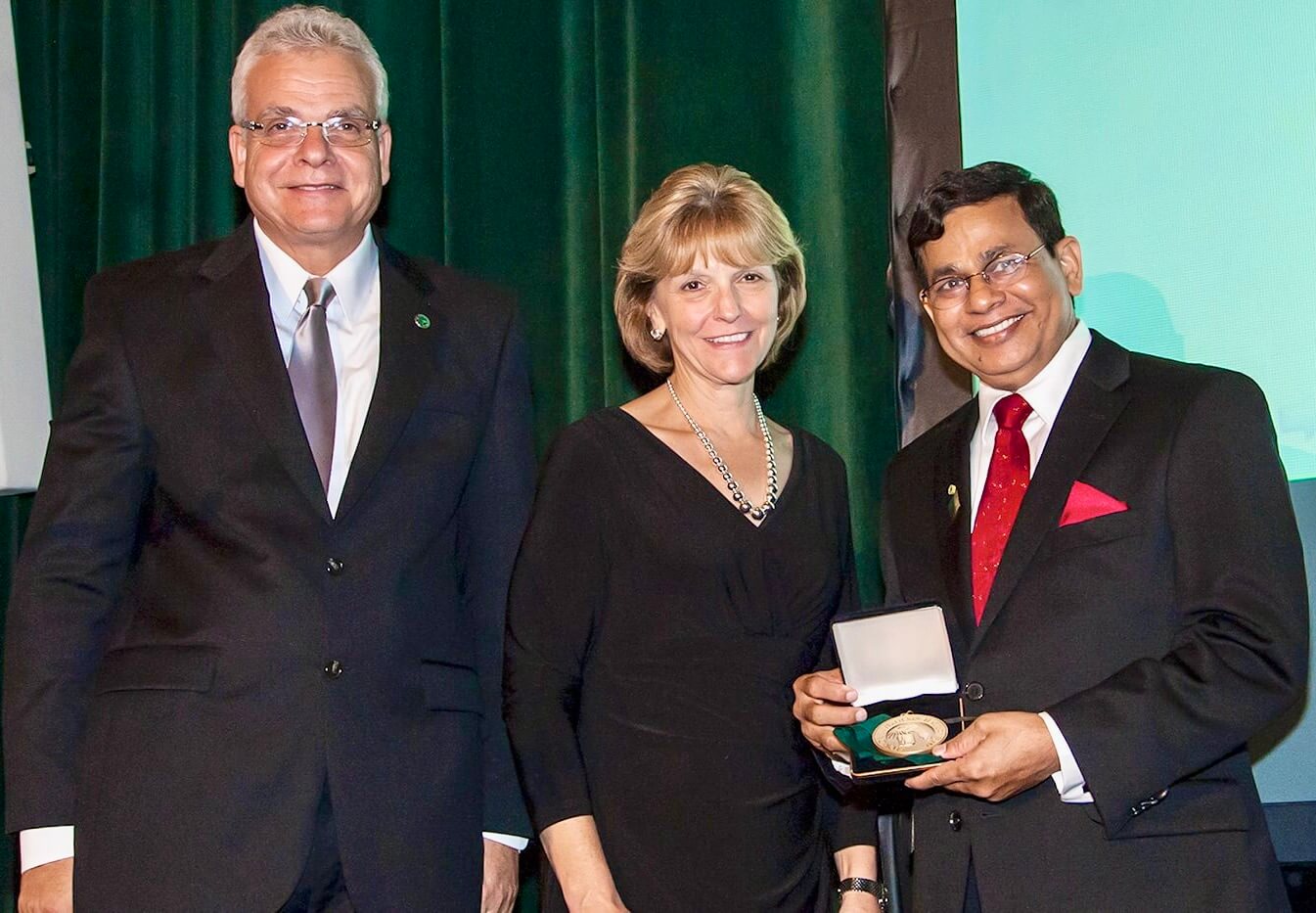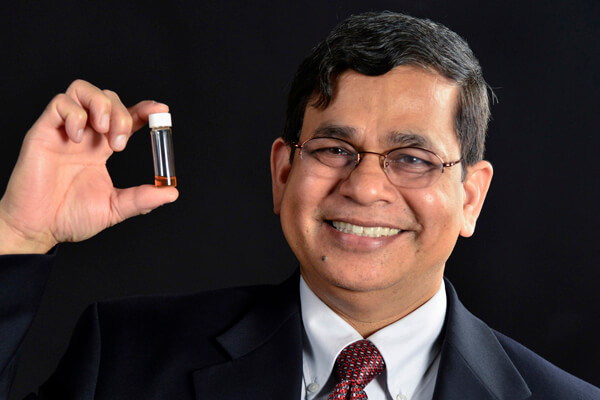
2024 News
Florida Innovator Spotlight: Dr. Shyam Mohapatra – Pioneer in Nanomedicine
Celebrating the Groundbreakers: Inaugural Class of The Florida Inventors Hall of Fame (2014)
June 28, 2024
By Lauren Parker
In a recent interview, Florida Inventors Hall of Fame 2014 inductee Dr. Shyam Mohapatra, shared his remarkable journey in the field of nanoscale biomedical diagnostics and therapeutics. Starting as a gene therapy scientist focused on asthma treatment, Dr. Mohapatra’s transition to nanotechnology was serendipitous. His search for a safer gene transfer method led him to explore nanotechnology, a field that was just beginning to take shape in the early 2000s.
“The National Nanotechnology Initiative (NNI) was created in 2004, following President Clinton’s signing of a bill in 2002,” Dr. Mohapatra recalled. “I consider myself among the pioneers because we were there right when it began, or even before it began.”

As a pioneer in the field, Dr. Mohapatra has witnessed and contributed to significant advancements in nanotechnology over the past two decades. Dr. Mohapatra’s research spans three main areas: nanomaterials, nanomedicine, and nanoelectronics. He leverages this transdisciplinary research to address cancers, asthma, viral infections, and traumatic brain injuries, especially as they relate to rapid or point-of-care diagnostics and nanotherapeutic interventions.
One of Dr. Mohapatra’s notable achievements includes the development of a platform for personalized cancer treatment developed in collaboration with Dr. Subhra Mohapatra, a professor and cancer biologist in the USF’s Molecular Medicine Department. By creating nanofibers from nanomaterials, his team could culture tumor cells outside the patient’s body, allowing for precise testing of drug efficacy. “This is crucial because many cancer treatments are trial and error. Our technology aims to identify the best treatment from the start, saving precious time and improving outcomes,” he explained.
As a co-founder of TransGenex Nanobiotech Inc (TGN), Dr. Mohapatra has led the company in manufacturing these innovative nanoscale products. TGN is also commercializing 3D cancer cell culture technology and services for anti-cancer drug discovery and personalized cancer treatment (PCTx). In collaboration with Dr. Charles Cox, an Endowed Professor in the USF ‘s Deapartment of Surgery, Dr. Mohapatra conducted clinical studies to have proof of concept for the PCTx technology. “Our goal is to bridge the gap between bench research and clinical applications, ensuring that our innovations directly benefit patients,” Dr. Mohapatra emphasized.
The rapid pace of Dr. Mohapatra’s innovations is evident in the growth of his patents. “Since my induction into the Florida Inventors Hall of Fame in 2014, my patents have increased from 40 to 60.” Among these is a rapid COVID-19 diagnostic test that delivers results in one to two minutes, a significant improvement over the seven day wait-time seen at the pandemic’s onset.

Over the course of his career, Dr. Mohapatra has allowed for serendipity to play a part in his scientific investigations. Dr. Mohapatra’s accidental discovery that stem cells could be used for cancer therapy exemplifies the unexpected nature of scientific breakthroughs. This occurred when Dr. Mohapatra was abroad, and a technician in his lab accidentally used a vial of stem cells instead of the intended cells for an experiment involving the respiratory syncytial virus (RSV).
“Lo and behold, all 100% of the stem cells in this culture were infected with the virus,” Dr. Mohapatra recounted with enthusiasm. Normally, only about 50 to 60% of epithelial cells get infected with the virus. This surprising result led to the realization that stem cells could be engineered to target and kill cancer cells.
The discovery’s significance lies in the unique properties of stem cells. When infected with the virus, the stem cells could be administered to the patient either intranasally or via injection. These infected stem cells would then migrate to the lungs, where 60 to 70% of them would localize and target the cancer cells without harming normal cells. This breakthrough has since been licensed to an Australian company based in New York, which is developing this technology further for lung cancer treatment.
Reflecting on this serendipitous discovery, Dr. Mohapatra said, “Sometimes, out of failure, an invention is born. It’s amazing how an unexpected event in the lab can lead to a revolutionary new treatment.”

Beyond his research, Dr. Mohapatra is passionate about STEM education and collaboration between academia and industry. He founded a Pharmaceutical Sciences Master’s program in nanotechnology at the University of South Florida (USF), which now ranks sixth nationally in online programs and second in the state of Florida. “Our program has grown from 4 to 92 students, and it includes concentrations in nanomedicine, translational research, biomedical engineering and entrepreneurship, with opportunities for internships in industry,” he noted. This program is notably the only program of its kind in the nation.
Dr. Mohapatra’s commitment to STEM education extends to high school students, emphasizing the importance of early exposure to research and innovation. “We need millions of STEM graduates by 2030. Without those STEM students, faculty, and workers, we are losing our competitiveness,” he stressed. His efforts align with the goals of the Florida Inventors Hall of Fame, which has become a hub for nurturing young inventors through initiatives like the Florida Invention Convention and the IGNITE Innovation Education & Outreach Program.
As a 2014 Inductee to the Florida Inventors Hall of Fame, Dr. Mohapatra expressed gratitude and pride. “I never anticipated this recognition. It’s an honor to be part of an organization that promotes STEM education and innovation in Florida,” he said. “We must train the next generation of scientists and inventors to maintain our nation’s competitiveness.”
Dr. Shyam Mohapatra’s journey from gene therapy to nanomedicine highlights the transformative power of curiosity and innovation. “Every day in research brings new problems and new issues. That’s what keeps us alive and passionate about what we do.” His work not only advances biomedical science but also inspires future generations to pursue groundbreaking research and make a lasting impact on society. As he continues to push the boundaries of nanotechnology, the future of personalized medicine and rapid diagnostics looks brighter than ever.
